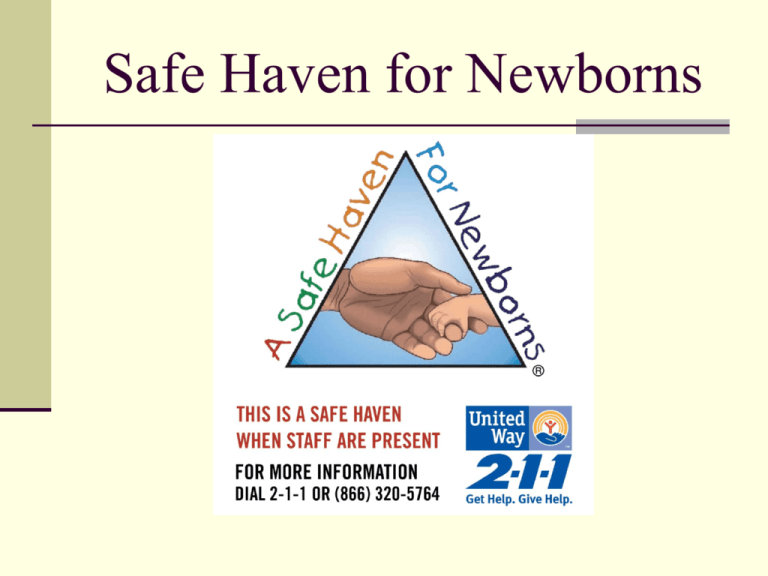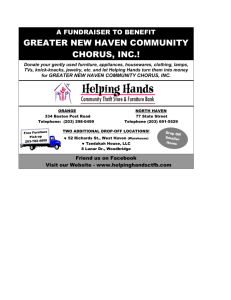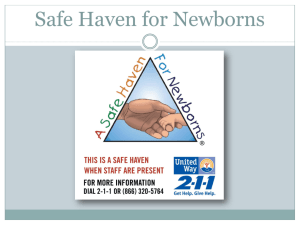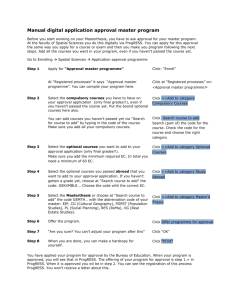2010 Community Safe Havens - Mother & Child Health Coalition
advertisement

Safe Haven for Newborns What Is a Safe Haven Law? First law passed in 1999 in Texas called the “Baby Moses law” As of July 2008 all 50 states have some form of this law Age for legal abandonment differs from state to state and ranges from 36 hours to 1 year old As of November 2008, Nebraska changed their Safe Haven law age limit from 18 years to 30 days old Local Legislation Missouri 2003 Safe Place for Newborns Act Kansas 2006 Newborn Infant Protection Act Where are Safe Havens? In Missouri: A newborn may be left in the hands of any staff on duty at hospitals, fire stations, ambulance or police stations. In Kansas: A newborn may be left in the hands of any staff on duty at hospitals, fire stations or city or county health departments. Why Do We Need This Law? 4 children die every day in the United States as a result of child abuse 3 out of 4 of these victims are under the age of 4 Newborns are at the greatest risk in the first day of their life Women need a viable alternative to abandonment, abuse or murder Who might use a Safe Haven? There is very little data but what we have indicates: Primarily women Come from all ages, education levels, ethnic backgrounds and income levels Likely have had no prenatal care Are unmarried and not in a relationship with the father of the baby Average age is between 18 and 22 years old Why might someone need a Safe Haven? Feel isolated and alone. Feelings of guilt, shame and fear preclude their decision to abandon. The newborn may be the result of incest or rape. Abandonment or neonatacide is part of the pregnancy denial and is a way to achieve ultimate closure to a traumatic event. Georgia’s Story Warning: This video contains graphic images and strong language. Issues With The Safe Haven Law Many are not aware the law exists Some fear it will appear we are advocating abandoning babies Some find it hard to be empathetic Supporting the Laws No funding in many states Low legislative priority What Can You Do? If you work at a facility identified as a Safe Haven, make sure your employer has guidelines. Make sure you and your co-workers are aware of your responsibilities. Share information about Safe Haven with your family, friends and neighbors. How Do We Spread the Word? Collaborate with Safe Havens in the community: hospitals, fire, police. Distribute branded signs to identify Safe Haven locations. Promote public awareness through education in schools and other community groups. Safe Haven for Newborns Coalition of Greater Kansas City A group of dedicated people and agencies in Kansas and Missouri have come together to promote awareness of the legislation. “Every newborn deserves a safe haven.” Agencies will know their responsibilities in receiving a newborn The public will know about this alternative Our Partners The United Way of Greater Kansas City supports the project with their 2-1-1 Call Centers. Anyone looking for additional information regarding local Safe Haven sites and resources can dial 2-1-1 or (866) 320-5764. Our Partners Mother & Child Health Coalition supports the efforts in the greater Kansas City area with a page on their website: www.mchc.net Go there for resources, and to learn more about the Safe Haven public awareness project in Missouri and Kansas. Other Partners KCPT produced a PSA and supports efforts promoting awareness. David Francis and the Francis Family Foundation donated Safe Haven signs and facilitates organizational supports. Nick Silverio, of A Safe Haven For Newborns (FL) shares resources and technical support. Many local fire, police, health and community organization staff give time and talents to work on community awareness projects. More Partners DST Systems, Inc. is supporting the education efforts with project grant funding for public awareness campaigns, including: Bus ads Billboards Learn more Visit us on the web at http://mchc.net/programs/safe_havens.aspx And friend us on Facebook, look for us under "KC Metro Safe Haven" Public Awareness Campaign Public Awareness Campaign Public Awareness Campaign Public Awareness Campaign Public Awareness Campaign Safe Haven Signs Posted Safe Haven Signs Posted Safe Haven Signs Posted Safe Haven Signs Posted References: Kunkel, K. Safe Haven Laws Focus on Abandoned Newborns and Their Mothers.. Journal of Pediatric Nursing, Vol.22, No 5, 2007. Cesario,S. Nurse’s Attitudes and Knowledge of Their Roles in Newborn Abandonment. The Journal of Perinatal Education, Vol. 12 No. 2, 2003. Bradley,D. Perspectives on Newborn Abandonment. Pediatric Emergency Care. Vol19, No.2, 2003. Bonnet,C. Adoption At Birth: Prevention Against Abandonment Or Neonaticide. Child Abuse and Neglect Vol.17, pp 501-513. 1993. Atwood, T. Comment: National Council For Adoption’s Response to the Texas Safe Haven Study. Child Maltreatment, Vol. 13, No. 1, 2008.






